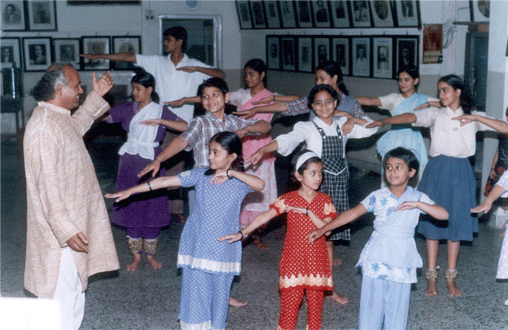Music and Dance Division:
It has already been mentioned elsewhere that the Institution did pioneering work in the field of prose Marathi
theater when the musical Marathi theater was at its pinnacle. Around 1965 - 70, the prose Marathi theater was
on the rise and today it is certainly far more popular than the musical theater. On this back-ground, Bharat has
retained, preserved and grown the tradition of musical Marathi theater by performing musical plays consistently.
Previously, producing such plays was a difficult task due to lack of finances. Since, 1970 the Club's own
theater has become a good source of income for Bharat and the problem of finance
was solved.

Vocal singing, playing of instruments and dance are the basic, foundational requirements of musical plays.
Considering this, Baburao Vijapure thought of having a separate wing for training youth in music and dance in a
classical and systematic way. With his initiative, regular classes for kathhak dancing and singing started in
Bharat. Balasaheb Gokhale, an exponent and expert in the Benaras style of Kaththak took the responsibility of
dance training since the inception of the Music and Dance Division, till 1982. Since 1982, his disciple Jaffer
Mulla has handled the Division very efficiently, till today. The Division has supplied a number of singers and
instrument players and dancers to take part in the Institution's musical plays. The Division offers training at
nominal fees and the Club has made arrangements that its students can appear for examinations of Gandharva
Mahavidyalaya and Tilak Vidyapeeth. Due to this tie up, 'Bharat's students of this Division can excel in the
fine arts till university level. The Institution has been granted status of Official Examination Center for
such examinations. For some time, the training in singing was given by Janubhau Marathe who had lived in the
company of Balgandharva. After the demise of Y.R.Karandikar, Mrs. Karandikar looks after the training and Pandurang
Mukhde teaches the Tabla.
In addition to the traditional training in these fine arts, the Institution arranges training workshops,
speeches and seminars of experts in different fields etc. On the foundation day of the Division, students
present their art. The Division has received guidance by eminent artists such as Chota Gandharva, Jaimala
Shiledar etc.
This Music and Dance Division, although sprang out of necessity, today has become a well-developed center
for fine arts and has offered valuable contribution in the field of theater and art. The Division has added to
Bharat's name and fame.
Top